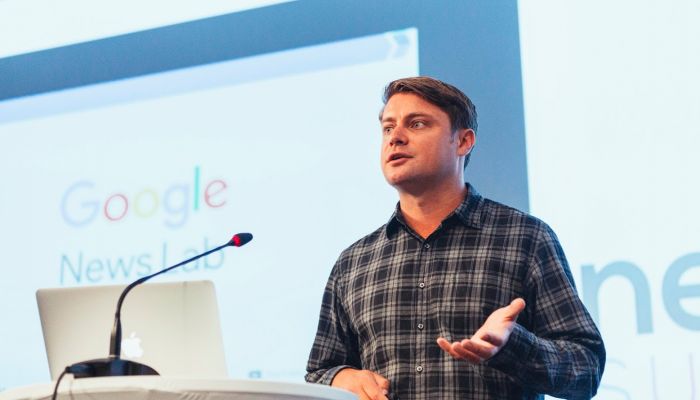Media Spotlight: Matt Cooke, Google News Lab
Matt Cooke is the Google News Lab lead for the UK, Ireland and the Nordics. Before joining Google, Matt worked at the BBC for seven years as a broadcast journalist. Matt, who is also a frequent public speaker, is passionate about teaching journalists techniques that will enhance their storytelling such as immersive 360-degree/VR technology. In this spotlight, Matt chats to us about why the approach to digital storytelling should be ‘story first, technology second, helping journalists to verify and fact check stories and engaging audiences through visual content.
Can you introduce yourself and talk a little about your professional background? Hello, I’m Matt Cooke – I’m a former journalist and now I’m part of the Google News Lab where I help editorial teams innovate and experiment with digital storytelling. I cover northern Europe – as I speak I’m on my way back from Finland and earlier this week I was in the Netherlands – I travel a lot! Before joining Google nearly five years ago I was at BBC News for about seven years where I worked across radio, television and online.
You worked for a long time as a presenter, reporter, and producer, why did you decide to switch to online? I started my BBC career at Millbank, but I soon moved to become the Home Affairs Producer for BBC London TV – that’s where I learnt from great journalists and hard-working producers. I started to present on BBC Three, I reported in Birmingham for a year and I presented on BBC Three over the weekend. But, it was just before 2012 when I realized I was ready to make a change. The BBC was experimenting with new ways of storytelling – for a time I filmed my own TV reports, wrote my own articles and made audio packages from a base in East London. This independence from the main newsroom gave me a taste to experiment with new formats and online content.
There seems to be a growing trend of people moving from more traditional media corporations like the BBC to online outlets like BuzzFeed, What’s driving this trend? I’m extremely grateful to the BBC – it was a great place to learn and looking back it was a brilliant place to work. As new opportunities at places like VICE News, BuzzFeed present themselves I think it’s only natural for inquisitive minds to investigate and consider a new challenge.
What do you most like about being a lead for Google News Lab? And what are the challenges? I spend about 40 to 50 percent of my time visiting newsrooms, talking to journalists – my job is to help them translate their stories and ideas into reality, with the help of technology.
The approach to digital storytelling should be ‘story first, technology second.’ Within newsrooms there are always different levels of experience when it comes to digital tools – some are experts and some are beginners. My background is not tech and I’m not an expert (on anything, actually!) so finding ways to communicate to all levels of interest and experience is something I have to do every day!
Within newsrooms there are always different levels of experience when it comes to digital tools – some are experts and some are beginners. My background is not tech and I’m not an expert (on anything, actually!) so finding ways to communicate to all levels of interest and experience is something I have to do every day!
How is Google News working with publishers to create innovative partnerships and experiments? The Digital News Initiative provides training and research, product development and an Innovation Fund – so far recipients (ranging from individual journalists to major news organizations) have received €51m in awards, a new round has just opened. You can learn more at digitalnewsinitiative.com.
Within the Google News Lab we’ve collaborated with lots of publishers and journalists – we supported projects such as 6×9; The Guardian’s first experiment in virtual reality, we’ve provided free access to training events across Europe (EJC, GEN and more) and we’re working with journalists to help verify and fact check stories surrounding the French election – that’s led by FirstDraftNews.com – a coalition we helped to launch back in 2015.
I just finished a project that helps journalism students gain experience within a newsroom – the Google News Lab Fellowship. We launched this in the UK last year and about 250 people applied, this year that shot up to 650 applications. I launched the scheme for the first time in Ireland and the Nordics too – the Fellowship is offering 28 placements in total!
What has been Google New’s approach to social media campaigns, and what has your experience been like working on them? The key though is to provide the right information, in the right style to the right audience on their platform of choice.
Can you talk about the current partnership between Google News Lab and YouTube newswire, and why it’s important? Eyewitness media, also known as UGC (user generated content) has become part and parcel of the daily newsgathering process for many journalists. Whether it is a breaking news event or a developing story we all now have the ability to capture high-definition video or stills – all with a smartphone. We’ve worked with Storyful to help journalists source the most credible, verified content on YouTube – to help them find video they can use and refer to in their storytelling. Every day the YouTube Newswire provides fresh playlists and showcases the latest eyewitness media. The best place to learn more about working with UGC content and eyewitness media in all of it’s forms it firstdraftnews.com
When trends do you think we will see this year in regards to how news content is created and distributed? Editors often talk about the renewed importance of video, often live and always shareable – mobile first audiences need video that is made for mobile handsets, not the TV. Traditional broadcasters such as RTÉ have excelled at creating content on a mobile, with video designed for audiences to consume on-the-go-you’ll be able to find subtitled interviews and a heavy use of graphics – all to engage the viewer for longer.
As a hub of the very latest news of everything that is happening in the world, how is Google responding to fake news? We have updated our publisher policies and now prohibit Google ads from being placed on misrepresentative content, just as we disallow misrepresentation in our ads policies. Moving forward, we will restrict ad serving on pages that misrepresent, misstate, or conceal information about the publisher, the publisher’s content, or the primary purpose of the web property.
One of the things you’ve championed is data journalism. Can you talk about how Google News Lab has incorporated this and how it connects with Google trends? Google trends provides anonymised, indexed, real-time data that can help journalists gain another perspective – the most searched for terms or the changing trends in themes and topics can be interesting. My favourite data visualisations are the simplest – they make things clear. On our website we provide self-paced learning on how journalists can use Google Trends to enhance their storytelling.
What has been your career highlight? Working as a reporter at BBC News was great, the chance to produce and prepare stories for television never lost its appeal. More recently, helping members of the Royal Family connect with audiences via Hangout was also memorable!!
Are you working on any exciting projects at Google News Lab this year? Yes, stay tuned – there is a tool refresh that focuses on audio – well worth an experiment!





Leave a Comment